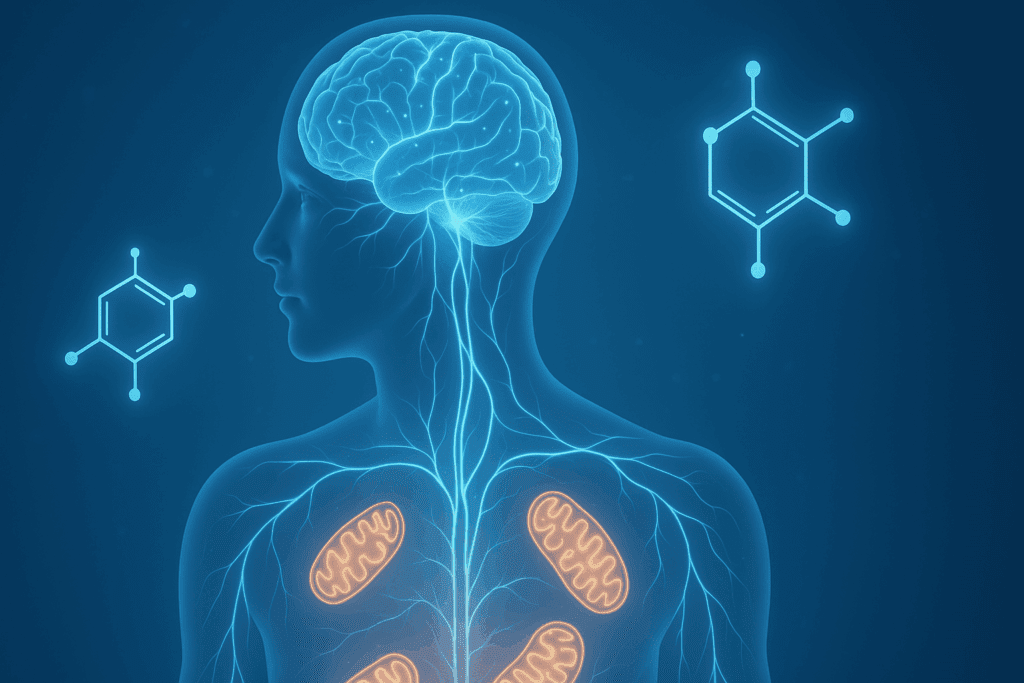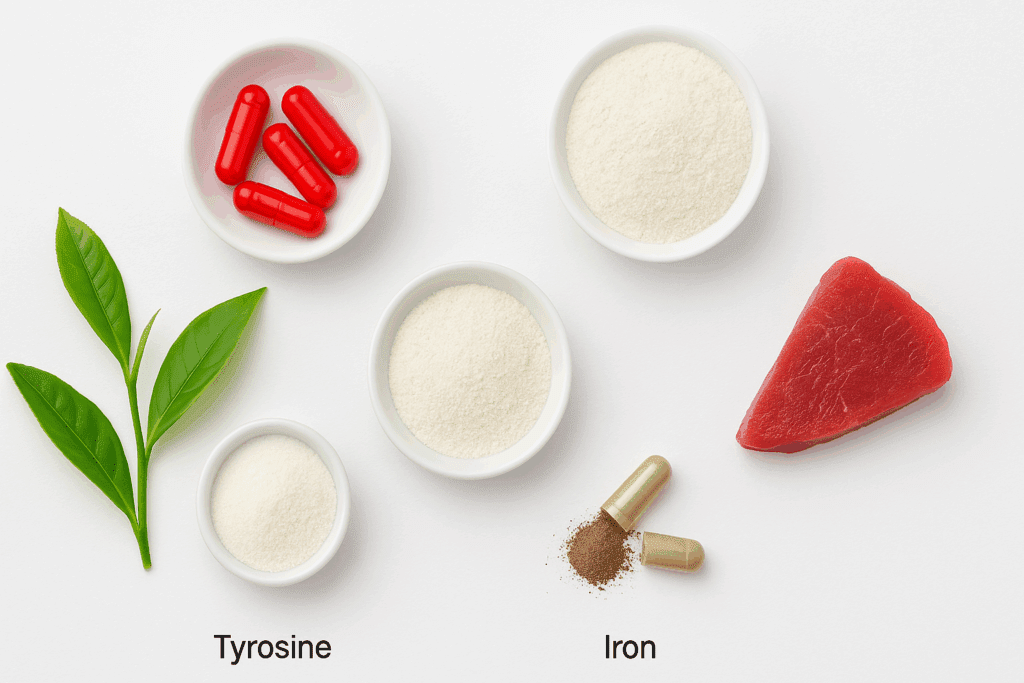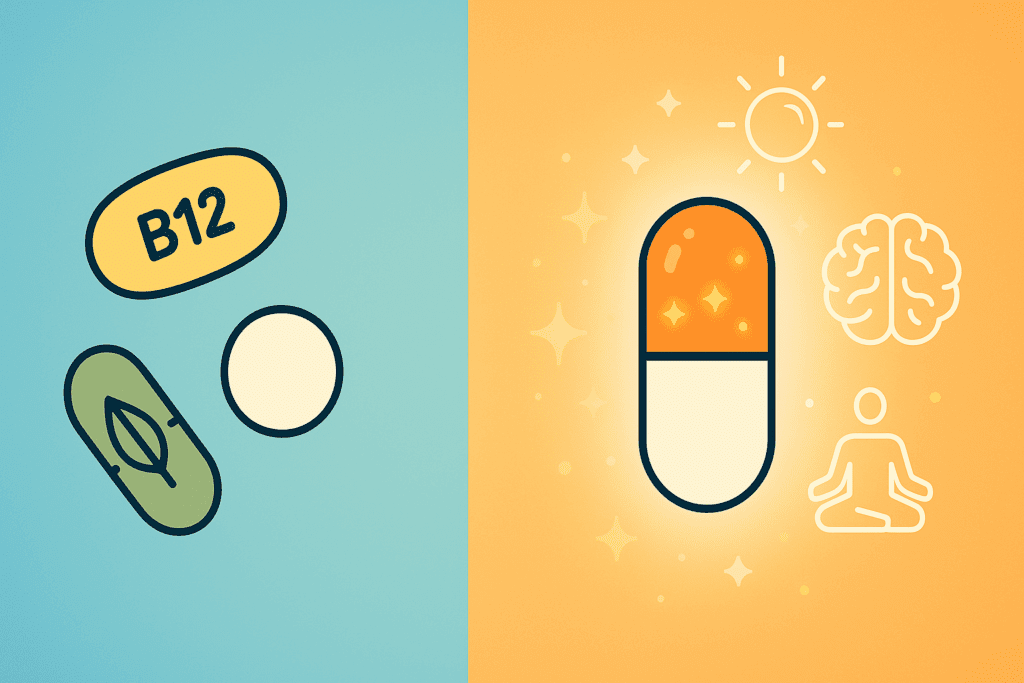In the fast-paced rhythm of modern life, the ability to maintain steady energy levels and sharp mental focus is increasingly prized. Whether you’re a student balancing deadlines, a professional navigating a demanding workweek, or someone seeking greater mental clarity amidst life’s daily stressors, the right supplements can serve as valuable allies. This guide explores the best supplements for energy and focus, particularly those that offer adaptogenic support—natural solutions rooted in centuries-old traditions but increasingly validated by modern science. The journey through this topic reveals not just what works, but why, drawing from expert insights and credible research to offer a holistic and trustworthy perspective.
You may also like: Unlock Powerful Stress-Relief with Adaptogenic Mushrooms and Stamina Herbal Support

Understanding Energy and Focus from a Holistic Health Perspective
To comprehend the role of supplements, one must first understand the intricate relationship between energy, focus, and the body’s internal systems. Energy, from a physiological standpoint, is not merely about feeling awake; it’s about cellular efficiency, mitochondrial function, and hormonal balance. Focus, on the other hand, is tied to neurotransmitter regulation, cerebral blood flow, and stress response systems like the hypothalamic-pituitary-adrenal (HPA) axis.
Modern lifestyles often interfere with these systems. Poor sleep, excessive screen time, processed diets, and chronic stress can impair the body’s ability to produce sustained energy and maintain attention. That’s where supplements step in—not as miracle cures, but as tools that support and optimize physiological processes. Vitamins for energy and focus often work in tandem with adaptogens to improve resilience, reduce mental fatigue, and promote clarity. Understanding this interplay ensures that supplement use is both intentional and effective.

Adaptogens: The Cornerstone of Stress-Relief and Cognitive Support
Adaptogens are natural substances that help the body adapt to stress and restore balance. Unlike stimulants, which offer a quick but temporary energy spike, adaptogens support long-term resilience. This distinction is vital because overstimulation of the nervous system can lead to burnout, while adaptogens gently modulate stress responses and improve energy metabolism.
Rhodiola rosea, for example, is known for enhancing cognitive performance under stress. Ashwagandha is celebrated for reducing cortisol levels, thus indirectly boosting energy and mental clarity. Eleuthero, sometimes referred to as Siberian ginseng, has been used in traditional medicine to enhance stamina and concentration. These adaptogens do not override natural processes; instead, they work synergistically with the body, making them ideal components in the best supplements for energy and focus.
Scientific Foundations: Why Supplementation Matters
Scientific research increasingly supports the use of certain supplements for improving cognitive function and energy metabolism. For instance, B-complex vitamins play a crucial role in mitochondrial energy production. Without adequate levels of B6, B12, and folate, the body struggles to convert food into usable energy. Likewise, magnesium is essential for over 300 enzymatic reactions, many of which relate to energy and neurotransmitter function.
The link between nutrition and cognitive health is also well-documented. Omega-3 fatty acids, particularly DHA, are integral to brain structure and function. Inadequate omega-3 intake has been associated with brain fog and decreased focus. When these nutrients are missing from the diet—a common occurrence due to modern eating habits—supplementation becomes not just beneficial but necessary. As we examine the best supplements for energy and focus, it’s important to understand this empirical foundation.

Key Nutrients in the Best Supplements for Energy and Focus
Several nutrients consistently appear in high-quality energy and focus supplements. Vitamin B12 is essential for red blood cell formation and neurological function. A deficiency can lead to fatigue, memory problems, and difficulty concentrating. Iron, while often associated with anemia, also supports oxygen transport to the brain and muscles, affecting both mental and physical energy levels.
L-theanine, an amino acid found in green tea, promotes calm alertness. It increases alpha brain wave activity, associated with a relaxed yet focused mental state. When combined with caffeine, it can enhance attention and reduce the jittery side effects often associated with stimulants. Tyrosine, another amino acid, is a precursor to dopamine and norepinephrine, two neurotransmitters linked to motivation and alertness.
These nutrients, among others, work together in sophisticated ways. The best supplements for energy and focus typically contain a combination of these ingredients, often in forms that ensure bioavailability and efficacy. When evaluating supplements, it is crucial to consider not only the presence of key ingredients but their dosages and forms.

Adaptogenic Mushrooms: Nature’s Neuroenhancers
Within the broader category of adaptogens, certain mushrooms offer especially potent support for cognitive and physical performance. Lion’s Mane (Hericium erinaceus) has garnered attention for its ability to stimulate nerve growth factor (NGF), a protein essential for neuron development and maintenance. Studies suggest it may improve memory, focus, and even mood regulation over time.
Cordyceps, another medicinal mushroom, has long been used in traditional Chinese medicine to increase stamina and vitality. It enhances ATP production, the energy currency of cells, which makes it particularly useful for physical endurance and mental alertness. Reishi mushroom, although better known for its calming effects, contributes to stress reduction, thereby supporting focus through the indirect pathway of emotional regulation.
These mushrooms do not act in isolation. Their polysaccharides, triterpenes, and other active compounds interact with the immune, endocrine, and nervous systems. As a result, adaptogenic mushrooms are increasingly included in formulations for stress-relief and cognitive enhancement. Their holistic profile makes them indispensable in the best supplements for energy and focus.
Evaluating the Effectiveness of Supplements: Quality Matters
Not all supplements are created equal. The efficacy of any supplement depends on several factors, including ingredient sourcing, manufacturing practices, and formulation design. Third-party testing ensures that the product contains what it claims and is free from contaminants. Certifications such as NSF, USP, or GMP (Good Manufacturing Practice) are indicators of trustworthiness.
Bioavailability is another key consideration. Some nutrients are better absorbed in certain forms. For example, methylcobalamin is a more bioavailable form of vitamin B12 than cyanocobalamin. Similarly, magnesium glycinate is less likely to cause gastrointestinal distress than magnesium oxide. When selecting supplements, understanding these differences can greatly influence their effectiveness.
Formulations that pair complementary ingredients often enhance results. A supplement combining Rhodiola, B-complex vitamins, and L-theanine, for instance, addresses multiple aspects of energy and focus—from cellular production to mood regulation. These synergistic blends are often more effective than taking each component in isolation. Therefore, when seeking the best supplements for energy and focus, product quality and formulation integrity should guide your choices.
The Role of Lifestyle in Enhancing Supplement Outcomes
Supplements can support energy and focus, but they are not a substitute for foundational lifestyle practices. Sleep, exercise, hydration, and a balanced diet are non-negotiables in the pursuit of cognitive and physical vitality. Supplements should be viewed as amplifiers, not replacements.
For example, taking magnesium before bed may improve sleep quality, which in turn enhances next-day focus. However, if sleep hygiene is poor—inconsistent schedules, excessive screen time, or caffeine intake late in the day—the supplement’s effect will be limited. Likewise, a supplement designed to boost morning alertness will work best when paired with exposure to natural light and a nutrient-dense breakfast.
Mindfulness practices like meditation can also enhance the effectiveness of adaptogens. By reducing baseline stress levels, the body becomes more responsive to the subtle balancing effects of herbs like ashwagandha and reishi. In this way, lifestyle and supplementation form a mutually reinforcing system that optimizes energy and focus.
Common Pitfalls: Avoiding the Hype in Supplement Marketing
The supplement industry is rife with bold claims and glossy marketing. Unfortunately, many products promise quick fixes without offering evidence-based formulations. It’s essential to approach supplement selection with a discerning eye. Look beyond branding to scrutinize ingredient lists, dosages, and the presence of unnecessary fillers or additives.
Another common pitfall is over-reliance on stimulants like caffeine. While caffeine can enhance alertness, excessive consumption may lead to dependence, anxiety, and sleep disruption. A more sustainable approach incorporates adaptogens and nutrients that support long-term cognitive resilience. This is especially important for individuals prone to stress-related fatigue, as the temporary boost from stimulants can mask underlying imbalances.
Consumers should also be wary of proprietary blends, which often obscure the actual amounts of each ingredient. Transparency is a hallmark of trustworthy brands. Choosing the best supplements for energy and focus involves more than finding popular products—it requires informed decision-making grounded in scientific understanding and personal needs.
Personalization: Tailoring Supplementation to Individual Needs
No two individuals have the same physiological makeup, lifestyle pressures, or health goals. Personalization is key when it comes to choosing the best supplements for energy and focus. What works for a high-performing athlete may not suit a student preparing for exams or a professional managing work-related burnout.
Genetic differences can affect how the body metabolizes certain nutrients. For instance, individuals with MTHFR mutations may have difficulty converting folic acid into its active form, methylfolate. In such cases, using supplements with bioactive forms of B vitamins is crucial. Similarly, someone with adrenal fatigue may respond better to ashwagandha than to ginseng, which can be too stimulating in certain contexts.
Functional testing, such as nutrient panels and hormone assessments, can provide data-driven insights into deficiencies or imbalances. Working with a healthcare provider ensures that supplementation is both targeted and safe. Personalized supplementation not only improves efficacy but also reduces the risk of interactions or over-supplementation.
Navigating the World of Vitamins for Energy and Focus
While adaptogens are essential, vitamins also play a central role in sustaining energy and enhancing concentration. B-complex vitamins, as previously noted, are indispensable for energy metabolism and nervous system function. Vitamin D, often overlooked, has emerging links to mood regulation and cognitive health, especially in individuals with deficiency.
Vitamin C supports adrenal function and helps mitigate the effects of stress. Though often associated with immune health, its role in synthesizing neurotransmitters like norepinephrine is less commonly discussed but highly relevant. Choline, a B-vitamin-like nutrient, is vital for acetylcholine production, a neurotransmitter involved in memory and learning.
These vitamins should not be taken in isolation unless there’s a specific deficiency. Balanced multivitamins or targeted complexes designed for brain and energy support tend to offer more comprehensive benefits. Again, quality matters—choose products that use well-absorbed forms and avoid artificial colors, sweeteners, or preservatives. In this context, vitamins for energy and focus are most effective when they complement a thoughtful, holistic approach.

Exploring Combination Formulas: Synergy Over Singularity
An emerging trend in supplement design is the development of combination formulas that offer multi-pronged support. These blends might include a base of B-complex vitamins, synergized with adaptogens like Rhodiola and mushroom extracts such as Lion’s Mane. The logic behind this approach is synergy—ingredients that work together to enhance each other’s effects.
For example, pairing cordyceps with CoQ10 enhances mitochondrial function from two angles: one boosts ATP production while the other improves electron transport chain efficiency. Similarly, a formula that combines magnesium with L-theanine addresses both the physical and psychological aspects of focus and stress management.
Such formulations are especially beneficial for individuals with multiple goals—improving energy, reducing stress, and enhancing focus. Rather than juggling multiple standalone supplements, a well-formulated blend offers convenience and comprehensive support. However, the same rules apply: scrutinize labels, research each ingredient, and avoid excessive reliance on any one compound. True optimization lies in balance, not extremes.

How to Incorporate Supplements Into Your Daily Routine
Even the most effective supplement will offer little benefit if not taken consistently. Incorporating supplements into a daily routine ensures that the body receives ongoing support. Morning routines are often ideal for energy-enhancing supplements, while calming adaptogens may be better suited to the evening.
Timing can affect absorption and efficacy. Fat-soluble vitamins like A, D, E, and K should be taken with meals containing healthy fats. Water-soluble vitamins like B-complex are generally best taken on an empty stomach for optimal absorption. Herbal adaptogens may have different effects depending on the time of day; for instance, Rhodiola is best taken in the morning due to its energizing properties.
Creating a supplement schedule that aligns with meals, energy needs, and lifestyle rhythms maximizes benefits and minimizes side effects. Keeping a journal to track effects can also help refine choices over time. Consistency, combined with attentiveness to the body’s feedback, is key to optimizing outcomes.
Frequently Asked Questions: Supplementing for Energy, Focus, and Resilience
What are some overlooked ingredients in the best supplements for energy and focus?
While common ingredients like caffeine and B vitamins are often highlighted, several lesser-known compounds offer significant benefits. Acetyl-L-carnitine (ALCAR) is one such nutrient, known for enhancing mitochondrial energy production and supporting brain health, particularly in aging populations. Another underappreciated compound is phosphatidylserine, a phospholipid that plays a critical role in cell membrane function and has been linked to improved attention span and memory. Citicoline (CDP-Choline) is also emerging as a powerful nootropic that boosts acetylcholine synthesis, enhancing cognitive processing speed and clarity. These ingredients are gaining traction in advanced formulas and can be particularly useful for individuals seeking an edge beyond standard vitamins for energy and focus.
How do stress and mental fatigue impact the effectiveness of supplements for focus?
Mental fatigue and chronic stress can reduce the body’s responsiveness to otherwise effective supplements by altering neurotransmitter levels and impairing hormonal regulation. When cortisol is chronically elevated, for instance, it disrupts the production of dopamine and serotonin—two neurotransmitters essential for motivation and mood. This imbalance can blunt the impact of even the best supplements for energy and focus unless the root stressor is addressed. Incorporating adaptogens like rhodiola or schisandra into a routine can modulate cortisol and support a more balanced neurological environment. Over time, addressing stress not only enhances supplement effectiveness but also fosters deeper resilience and mental agility.
Can vitamins for energy and focus improve academic or workplace productivity?
Yes, but the benefits depend heavily on individual baseline nutrient status, consistency of use, and the cognitive demands of the task. Students or professionals facing prolonged concentration periods may find B-complex vitamins, particularly B6 and B12, helpful in sustaining mental endurance. Vitamin D also plays a role in mood regulation, which indirectly supports productivity by reducing the risk of depressive symptoms. For high-stakes environments requiring verbal fluency or strategic thinking, adding nootropics like bacopa monnieri or lion’s mane may further sharpen cognitive output. Productivity gains are most sustainable when these supplements are integrated with structured work habits and adequate sleep hygiene.
How long does it typically take to notice improvements from supplements targeting energy and focus?
The timeline for noticing effects varies based on the ingredient, dosage, and individual biochemistry. Fast-acting compounds like caffeine or L-theanine may yield benefits within 30–60 minutes. In contrast, adaptogens such as ashwagandha or mushrooms like lion’s mane may require two to six weeks of daily use to reveal full effects, as they work gradually to recalibrate stress-response systems and neural pathways. For vitamins for energy and focus, improvements might be noticeable within a week if correcting a deficiency, while subtle neurocognitive benefits may take longer to become evident. Patience and consistency are key—many of these substances rely on cumulative effects rather than immediate stimulation.
Do gender or hormonal fluctuations influence the best supplements for energy and focus?
Yes, hormonal cycles can significantly influence how certain supplements affect energy and cognition, especially in individuals assigned female at birth. During the luteal phase of the menstrual cycle, for instance, drops in estrogen and serotonin levels can lead to brain fog and fatigue. Supplements like magnesium, vitamin B6, and adaptogens such as maca root can help stabilize mood and energy during this time. For individuals undergoing menopause, declining estrogen levels may also impact focus and memory, making phytoestrogens like red clover or cognitive-enhancing adaptogens particularly beneficial. Personalized approaches that account for hormonal fluctuations often yield better results than one-size-fits-all regimens.
Why are some people unresponsive to even the best supplements for energy and focus?
Several factors may limit an individual’s response to supplementation, including poor gut health, which impairs nutrient absorption, or genetic polymorphisms that affect how nutrients are metabolized. For instance, individuals with the MTHFR mutation may not efficiently convert folic acid into its active form, resulting in diminished benefits from standard B-complex supplements. Chronic inflammation or unrecognized food intolerances can also blunt cognitive gains by continuously activating immune pathways that drain energy. Addressing foundational health issues through testing and dietary adjustments often enhances the body’s ability to respond to targeted supplementation. In these cases, functional medicine approaches offer a more tailored solution.
How do vitamins for energy and focus interact with prescription medications?
Many over-the-counter supplements can interact with prescription drugs, either enhancing or inhibiting their effects. For example, high doses of vitamin B6 can interfere with the efficacy of certain anti-epileptic drugs, while ginseng may increase the risk of bleeding when taken with blood thinners like warfarin. Adaptogens like ashwagandha may lower blood pressure, potentially compounding the effects of antihypertensives. It is essential to consult with a healthcare provider before introducing new supplements, especially if medications are already in use. A qualified practitioner can assess interactions and help determine safe, synergistic options for improving energy and focus without compromising medical treatments.
What role does gut-brain communication play in supplement effectiveness?
The gut-brain axis—an intricate communication network between the gastrointestinal system and the central nervous system—plays a crucial role in how the body responds to nutrients and nootropics. A dysregulated microbiome can impair the production of neurotransmitters like serotonin and GABA, both of which influence mood and attention. Supplementing with probiotics or prebiotic fibers may enhance the efficacy of other brain-targeted supplements by creating a healthier gut environment. Some of the best supplements for energy and focus now include synbiotics to support this relationship. Emerging research even suggests that certain strains like Lactobacillus plantarum can directly impact cognitive performance and resilience under stress.
How do environmental toxins affect the body’s ability to maintain energy and mental clarity?
Exposure to environmental toxins such as heavy metals, air pollutants, and endocrine disruptors can interfere with mitochondrial function and neurological clarity. These substances increase oxidative stress and inflammation, two major contributors to cognitive sluggishness and chronic fatigue. Detox-supportive nutrients like N-acetyl cysteine (NAC), alpha-lipoic acid, and glutathione precursors may enhance cellular defense mechanisms. Although these are not traditionally categorized under vitamins for energy and focus, they serve a protective role that indirectly preserves cognitive health. Incorporating antioxidant-rich supplements, along with environmental detox strategies, can be especially helpful for individuals in urban or industrial areas.
What are the future trends in the best supplements for energy and focus?
Future formulations are moving beyond basic vitamins and herbs toward precision nutrition driven by biometric data and genomic testing. Companies are beginning to offer personalized nootropic stacks based on DNA profiles and real-time tracking of biomarkers like HRV, sleep quality, and cortisol patterns. Nanoemulsion technology is also being explored to enhance the bioavailability of fat-soluble adaptogens and vitamins. Additionally, wearable tech that syncs with supplement intake is likely to transform how consumers track the effectiveness of their cognitive health regimens. As scientific understanding deepens, the best supplements for energy and focus will become more customized, evidence-driven, and aligned with individual neurobiology.
Final Reflections: Choosing the Right Path Forward with Confidence and Clarity
The search for improved energy and sharper focus is both deeply personal and profoundly universal. By integrating adaptogenic support, essential nutrients, and lifestyle alignment, individuals can craft a sustainable path to enhanced well-being. The best supplements for energy and focus are not about short-term boosts but long-term resilience, cognitive clarity, and emotional stability.
As we navigate the vast landscape of supplements, it is essential to remain informed, critical, and attuned to our unique physiological signals. By grounding our choices in evidence-based principles and personalized strategies, we empower ourselves to make decisions that elevate not just performance, but quality of life. With adaptogenic mushrooms, vitamins for energy and focus, and thoughtful supplementation as part of a balanced lifestyle, a more vibrant, focused, and energized existence is well within reach.
Further Reading:
6 Vitamins and Supplements for Energy: What the Science Says
